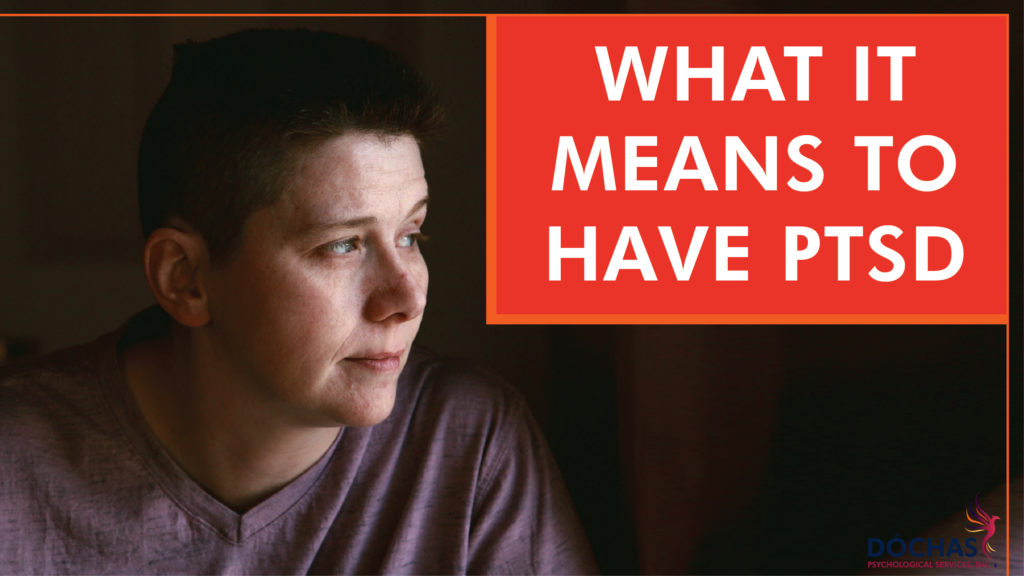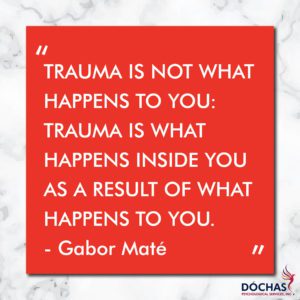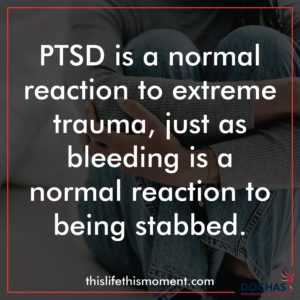Welcome back to the blog! It’s Kim here. Today I want to talk about a mental health disorder that deserves some clarification, and that’s Post Traumatic Stress Disorder.
Post Traumatic Stress Disorder (PTSD) is a very real and destructive disorder. If you or a loved one have been diagnosed with PTSD, then you know the ripple effects that it can have on your family. If you don’t know anyone that has been diagnosed, you might have some questions about the disorder. What causes PTSD? What are the signs? How do you know if you really have it? In this video, I answer all of these questions to help you understand the true meaning of Post Traumatic Stress Disorder.
It’s important to note that this video, along with other videos on our YouTube channel, are not meant to self-diagnose. This video is meant to give information about PTSD so you can have a more clear picture of what it is, how it affects people, and how to get help if you think you or a loved one might have it.
Watch to learn about PTSD, or keep scrolling to read more!
What it means to have PTSD
When you hear of PTSD your mind likely goes straight to trauma. It’s right there in the name: Post Traumatic Stress Disorder. To me, trauma is anything that occurs to make your normal coping system overwhelmed. When we look at it this way, it’s safe to say that most of us have experienced trauma at some point in our lives.
But for some of us, that traumatic event can create long-lasting impacts, causing Post Traumatic Stress Disorder.
Criteria for PTSD
The key difference between experiencing trauma and having PTSD is the symptoms. In our practice we use the Diagnostic and Statistical Manual of Mental Disorders (DSM-5) to diagnose patients with a number of disorders.
The DSM-5 lays out the following criteria a patient must have in order to be diagnosed with PTSD:
- Experience a physical threat, meaning actual or threatened death, serious injury, or sexual violence. A person can experience a physical threat by witnessing these events themselves or learning that these events occurred to a friend or loved one. A physical threat does not include exposure to traumatic events through television or media.
- Experience intrusion symptoms. This is where traumatic thoughts pop into your head unintentionally and unexpectedly.
- Experience avoidance symptoms.
- Experience changes in how you think and your overall mood.
- Experience changes in emotion where you have triggers that cause you to feel overwhelming emotions.
Just because you don’t meet the criteria for PTSD doesn’t mean you haven’t experienced something traumatic. The DSM-5 also lays out symptoms for Stressor Related Disorders. These account for other ways people can experience trauma without meeting the criteria for PTSD.
Have more questions? Connect with us!
It’s so important for us to correctly define what it means to have PTSD. We see a lot of people who get an improper diagnosis, and it only hurts the patient in the end. Whether someone has PTSD or another Stressor Related Disorder, it’s imperative that they get the correct diagnosis so they can undergo a treatment plan that will be effective for them. And the only way to get a proper diagnosis is to see a licensed professional.
If you have more questions about PTSD or other disorders, don’t hesitate to get in touch with us! Give us a call at (780) 446-0300 or email us at info@dochaspsych.com. We’re happy to help you.
About Dochas Psychological
Dochas Psychological Services is a well-established and trusted therapy clinic located in Spruce Grove, Alberta. At Dochas we value the idea that everyone deserves a safe space. Through connection and education, our team works hard to build a trustworthy relationship with each of our clients. It is our goal to create a community for our clients to feel like they belong.
Disclaimer
Information provided through Dochas Psychological Services blogs or vlogs are meant for educational purposes only. They are NOT medical or mental health advice. You can read more about our disclaimer here.



